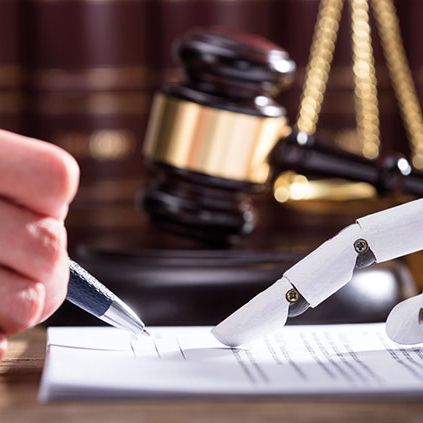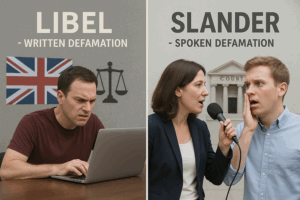Defamation of character: Meaning, examples, and legal remedies in the UK

Has someone spread lies about you that are destroying your reputation? Are you wondering if that malicious social media post or workplace rumour constitutes defamation? False statements can obliterate careers, relationships, and mental health within hours in today’s digital world. UK law provides robust protection, but understanding when words become legally actionable requires precision. This insider analysis reveals what separates winning claims from expensive failures, including overlooked criminal law crossovers. Given the unforgiving one-year limitation period, consultation with a specialist defamation lawyer is critical.

KEY TAKEAWAY: What makes defamation legally actionable versus just hurtful?
Discover what makes defamation actionable and how to protect yourself.
What does defamation mean under UK law?
Defamation occurs when someone publishes a false statement that damages another person’s reputation in the eyes of right-thinking members of society. The meaning encompasses any communication that exposes someone to hatred, ridicule, or contempt, or causes them to be shunned or avoided.
UK law recognises two fundamental categories of defamation, established centuries ago, and each with distinct evidential requirements and damages rules:
- Libel refers to permanent forms, such as written publications, broadcast media or electronic records, where damage is presumed and no proof of financial loss is required (actionable per se).
- Slander, by contrast, covers temporary expressions like spoken words or gestures. It usually requires proof of special damages, unless the allegation involves serious matters such as criminal conduct, contagious disease, professional incompetence or sexual impropriety.
In both cases, the statement must be published to a third party who understands its defamatory meaning and its reference to the claimant. The distinction also affects limitation periods, since libel has a clear publication date while slander is more fleeting and harder to establish.
How do you recognise defamation?
Defamation requires three fundamental elements that courts scrutinise before accepting claims. Failing any single requirement destroys your entire claim regardless of damage suffered:
- Publication requirement: Publication occurs when someone communicates a defamatory statement to at least one third party who understands its meaning. This includes emails, social media posts, workplace conversations, and accidental disclosures. Libel covers any permanent record, while slander requires witnesses who heard spoken words. Republication by others creates additional liability, though platforms may claim operators’ defences.
- Impact on reputation: The statement must damage your standing in right-thinking members of society’s eyes, exposing you to hatred, ridicule, or causing others to shun you. Modern law requires proof of serious harm, not hurt feelings. Courts examine whether ordinary readers would think less of you. Business claimants need evidence of serious financial loss; personal claimants must demonstrate genuine reputational damage beyond trivial harm.
- Reference to the claimant: Readers must reasonably understand the defamatory statement refers to you specifically. This occurs through direct naming, photographs, job descriptions, or identifying details connecting the statement to your identity. Courts apply an objective test: would ordinary readers familiar with circumstances identify you as the subject? Anonymous references satisfy this requirement if audiences possess sufficient connecting information.
Common examples of defamation in practice
Defamation manifests across various platforms, each presenting unique challenges for victims seeking redress. Modern cases increasingly blur libel and slander boundaries as digital communications create permanent records:
- Social media defamatory statements: Facebook posts falsely accusing theft, fraud, or criminal behaviour constitute classic libel. Twitter threads claiming professionals are incompetent or corrupt damage reputation Instagram stories suggesting infidelity or disease expose victims to ridicule. Review sites hosting fabricated negative experiences create serious financial harm. WhatsApp messages spreading false rumours reach substantial audiences despite seeming private. LinkedIn posts questioning professional integrity directly impact career prospects.
- Traditional media cases: Newspaper articles containing factual errors about criminal investigations or business failures remain actionable. Television broadcasts suggesting corruption without factual basis face substantial damages Radio shows making unfounded allegations create lasting harm. Magazine publications printing gossip as fact generate successful claims. Documentary programs presenting misleading narratives through selective editing constitute defamation despite truth claims.
- Workplace defamation: Managers falsely accusing employees of misconduct to colleagues create career damage. Performance reviews containing fabricated criticisms harm professional standing permanently. Office gossip spreading false rumours about criminal behaviour constitutes slander. Reference letters with deliberate falsehoods prevent employment opportunities. Internal emails copying recipients with defamatory content create widespread publication requiring intervention.
How do you prove defamation in UK courts?
Proving defamation requires meeting strict legal tests that have become increasingly demanding since the Defamation Act 2013. Courts scrutinise evidence rigorously, and weak cases face devastating costs orders:
- Burden of proof: Claimants must prove the statement is defamatory, refers to them, and was published to third parties. The burden shifts to defendants to prove defences like truth or honest opinion. Courts require clear evidence rather than speculation. Publication needs proof through witnesses, digital records, or concrete evidence. The standard remains balance of probabilities, not beyond reasonable doubt. Defendants’ silence cannot substitute for proof of falsity.
- Serious harm test: The Defamation Act 2013 mandates proof that publication caused or will likely cause serious harm to reputation. Personal claimants must demonstrate genuine damage beyond hurt feelings. Corporate claimants need evidence of serious financial loss or likelihood thereof. Courts examine statement gravity, publication extent, and actual impact. Potential harm alone no longer suffices; actual damage evidence becomes essential.
- Evidence requirements: Digital evidence requires screenshots, URLs, and metadata proving publication dates and reach. Witness statements must detail who saw the statement and understood its meaning. Expert evidence may be needed for technical or foreign law Businesses claiming losses need financial evidence. Social media analytics, website traffic data, and correspondence showing impact strengthen claims. Professional damage requires evidence from colleagues, clients, or industry contacts.
What are the legal outcomes of defamation?
Defamation creates serious legal and financial outcomes for both sides, with claimants seeking vindication while defendants face potentially devastating liability:
Remedies for successful claimants
Successful claimants obtain injunctions preventing further publication and forcing content removal from platforms. Monetary compensation includes general damages for reputational harm and special damages for proven financial losses. Courts order publication of summaries clearing claimants’ names in the same medium where defamation appeared. Interim injunctions provide immediate protection during proceedings.
Failed claims result in devastating costs orders requiring claimants to pay defendants’ legal expenses, often exceeding £100,000. Unsuccessful claimants face further reputational damage from public defeats and Streisand effect increasing harmful publicity.
Consequences for defendants
Losing defendants face substantial damages awards, legal costs, and court-ordered apologies damaging their reputation. Courts grant website blocking orders and injunctions restricting future speech. Aggravated damages apply where defendants behave badly or refuse reasonable settlements.
Defendants have powerful defences: truth provides absolute protection regardless of damage caused; honest opinion protects genuinely held views based on facts; public interest covers responsible journalism; and privilege protections apply to parliamentary proceedings and court reports.
Do I need a defamation solicitor for my case?
Defamation law demands specialist expertise that general practitioners rarely possess, making experienced legal representation essential for both claimants and defendants:
- Expert case assessment: Specialist solicitors evaluate claim strength before proceedings begin, applying the serious harm threshold to decide whether a case should proceed or be withdrawn.
- Procedural mastery: With only a one-year limitation period and strict court rules, professionals ensure compliance and handle urgent applications for interim injunctions that self-represented parties often mishandle.
- Specialist legal knowledge: Modern defamation frequently overlaps with harassment law, data protection and platform liability. These complexities are beyond the scope of most general practitioners.
- Powerful defence strategies: Experienced solicitors identify robust arguments such as truth, honest opinion or public interest that inexperienced lawyers may completely overlook.
FAQs
What’s the difference between libel and slander? Libel covers permanent forms including written statements, social media posts, emails, and broadcasts that create lasting records. Slander involves temporary spoken words or gestures. Libel claims proceed without proving financial loss, while slander typically requires evidence of actual damages except for serious allegations.
Is defamation a criminal offence in the UK? Defamation remains primarily a civil matter pursued through courts for damages and injunctions. However, overlapping criminal law provisions exist for harassment, malicious communications, and persistent online abuse that may apply alongside civil claims.
Who can sue for defamation of character? Individuals, companies, charities, and organisations with established reputations can bring defamation Government bodies and political parties cannot sue for defamation. Claims must be filed within one year of publication, and deceased persons cannot be defamed under UK law.
Defamation law protects reputations while balancing free speech rights through complex legal frameworks. Understanding the distinction between libel and slander, available defences, and evidential requirements proves crucial for both victims and defendants navigating these high-stakes proceedings.
Stop defamation!
Qredible’s network of specialist solicitors provides expert guidance for both pursuing and defending claims.
KEY TAKEAWAYS:
- Defamation occurs when false statements damage someone’s reputation, with libel covering permanent forms like social media posts and slander involving spoken words, each requiring specific evidence and meeting the serious harm threshold under modern UK law.
- Successful claims demand proof of publication to third parties, reference to the claimant, and actual reputational damage, while defendants can use powerful defences including truth, honest opinion, and public interest protections.
- Both claimants and defendants face financial risks including six-figure costs orders, making specialist defamation solicitor representation essential given the unforgiving one-year limitation period and complex procedural requirements.
Articles Sources
- lexisnexis.co.uk - https://www.lexisnexis.co.uk/legal/glossary/defamation
- legislation.gov.uk - https://www.legislation.gov.uk/ukpga/2013/26
Do you need a solicitor?
Find a solicitor on Qredible in just a few easy steps

















